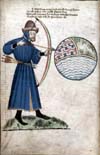| The Blind Man |
International
John Gower
Society
|
The Blind Man In Trevet’s version of the tale of Constance, after having floated for many years on the sea in the boat provided by the sultaness, Constance lands in Northumberland. She is well cared for by Olda, a kind steward, and his wife, Hermegild. Trevet then gives an account of the conversion scene in some 700 words, which I summarize here:
Gower changes his version of this scene, shortening it to roughly 250 words. His version runs as follows:
The basic plots of the two scenes are parallel, though Gower greatly curtails or eliminates many details in order to include a few others. Gower does not include the content of Constance’s teachings to Hermyngheld, Constance’s reassurance of Hermyngheld on the beach, the references to the Welsh and Wales, or the baptism of the household, but he does add Elda’s idea to marry Constance to the king. Many of these changes have the combined effect of eliminating much of Constance’s agency. Though not the most immediately obvious change, one of the most important changes Gower makes to Trevet’s story in this section are the references to the Welsh and Wales—changes made in reflection of the contemporary Anglo-Welsh political situations. To begin with, Trevet described the man healed by Hermegild as being “un povre Cristien Bruton enveuglés” [“a poor blind Christian Briton”] (NLC, 176). Gower merely describes him as “a blind man” (CA, II, 759) and mentions neither his social class nor his nationality or religion. These last two omissions are important, as it is the healing of the blind man that directly leads to Olda’s/Elda’s conversion. When Trevet wrote his redaction of the tale, England and Wales were experiencing a time of relative peace after England’s final takeover of the Welsh government in the time of Edward I. Trevet was, therefore, free to describe the man as being a Briton, an important depiction because of the contrasting of the Welsh and the Saxons during the immediately post-Arthurian period of the tale. The Welsh had been Christian at the time of the tale for around a century, having received the religion from Irish monks; the Saxons were still pagan and were eventually converted through the combined efforts of the Welsh, Irish, and Scottish missionaries. Furthermore, by naming the man as a Briton rather than as a Welshman, Trevet used the name the Welsh used for themselves, “British,” rather than the name “Welsh,” the word the Saxons used for them, from the Anglo-Saxon word “waelisc,” a pejorative term for foreigners. By allowing the blind man to be Welsh, Trevet gave the Welsh a role alongside Constance in the conversion of the Saxons. The nationality of the blind man then became even more important when he returned to Wales to retrieve Bishop Lucius of Bangor, a figure who became extremely important throughout the rest of the tale. In this section alone, Bishop Lucius cemented the conversions made by Constance through the baptisms of the members of Olda’s household. By the time Gower wrote his version of the tale, however, the political situation between England and Wales had drastically deteriorated. Owen Glyndwr, later known mostly by the character based on him in Shakespeare’s I Henry IV, led the Welsh in a major uprising against the controlling, colonizing power of the English (this being part of what led to the deposition of Richard II). The revolt was vicious, terrifying, and almost successful. Because of the fear inspired, when Gower—a supporter of King Henry, to whom the Confessio Amantis was dedicated—wrote his tale, nearly all references to the Welsh present in Trevet’s tale were eliminated. This is important as a reflection of the political times, but also works in the tale to give all the credit for the conversions to Constance herself—one of the only moments in which Gower gives Constance more credit and agency than did Trevet. Bishop Lucie appears once, much later, but at an intriguing moment: it is still Lucie who baptizes the Saxon king, Allee, in what must be a nod to the historical truth. He, and all other traces of Wales and the Welsh, then disappear altogether from the story. Another change that Gower makes is the elimination of the different types of knowledge that Constance imparts to Hermyngheld. In Trevet’s version, Constance told Hermegild all about the Bible, including everything from the Genesis story of Creation to the flood and Noah’s ark in the Old Testament, to the birth of Jesus Christ, his Passion, resurrection, ascension in the New Testament, and also about the nature of the Trinity. Theology aside, Constance discussed the concepts of heaven and hell, and also told Hermegild about the various sacraments and the faith of the church. Gower eliminates all of this detail. We are told simply that “Thurgh grace of goddes pourveance / This maiden tawhte the creance / Unto this wif so parfitly” (CA, II, 753-55). Gower takes away any demonstration of Constance’s knowledge, instead allowing her to teach and preach perfectly because of the grace of God. There is no indication given as to whether Constance has any scriptural knowledge; she instead becomes a divinely inspired missionary whose teaching proves the power of God. Closely related to this lowering of Constance’s knowledge is Gower’s elimination of the Welsh bishop from this section of the story. In Trevet’s tale, when Bishop Lucius came from Wales to baptize Elda’s household, he first tested them on their knowledge of the faith and found them to be very well taught. In eliminating Bishop Lucie from this scene, Gower does not validate the efficacy of Constance’s teachings. We can believe her teachings in Gower’s tale to be very good because of their divine inspiration, but there is no outside affirmation of this. Through this change, Gower works to make Constance a vessel for God’s work, rather than an independent agent of evangelism. Furthering Gower’s diminishment of Constance’s role is the scene on the beach where Hermyngheld restores the sight of the blind man. After the blind man requested the aid of Hermegild in Trevet, she faltered momentarily, and Constance said to her in Norman French, “‘Ne muscez pas, dame, la vertue qe Dieux te ad done’” [“‘Lady, do not hide the power God has given you’”] (NLC, 183-84). After this reassurance, Hermegild said to the man in Middle English (what Trevet referred to as Saxon), “‘Bisne man [in] Jhesu name in [rode] yslawe, have thi siht’” (NLC, 185-86). Trevet even changed languages, from Norman French to Middle English, within the text to further illustrate the language switch. Presumably, because the blind Briton of Trevet’s tale would not have been able to understand the Saxon tongue any more than Hermegild and company would have been able to understand his Welsh, there was even a further miracle in the cross-linguistic understanding, which Trevet seems to have attributed to the power of the Holy Spirit. By eliminating the nationality of the blind man, Gower lessens the number of concurrent miracles on the beach. There is no switching of languages for understanding, and, upon the request for healing, Hermyngheld merely trembles and then says, in almost exactly parallel language, “‘In trust of Cristes lawe, / Which don was on the crois and slawe, / Thou bysne man, behold and se’” (CA, II, 769-71). In both tales, Hermegild/Hermyngheld makes reference to the death of Christ on the Cross in her healing, and therefore shows a small example of the actual content of her learning. In Gower, however, Constance is no longer needed to assuage the anxious Hermyngheld’s fears—she may not even be on the beach; the latter is fine on her own. A final major change that Gower makes from Trevet’s tale is to eliminate the baptisms by Bishop Lucius. Aside from the ideas discussed above relating to Gower’s weakening of the Welsh role of the story, the lack of the baptisms in Gower’s story relates strongly to his diminishment of the power and agency of Constance’s role in the story. Trevet showed that not only did Bishop Lucius come from Wales in order to perform the baptisms, but also that he examined the knowledge of the prospective converts. The reader was therefore assured that Constance did, in fact, teach wisely and well, and that, furthermore, the conversions were indeed completed fully. In Gower’s version, however, no baptisms are ever performed by anyone. Although it seems that we can assume that Elda, his wife, and the king do convert, there is no actual confirmation of that fact for a long time, nor is there ever any sort of verification that Constance is true to the word of God in her teachings. Gower makes a few minor changes. He does not, as did Trevet, enumerate the conversions accomplished by Constance in this part of the story. Gower also drops the blind man from the story immediately after he has had his sight restored; it is impossible to know whether or not the blind man has anything else to do with the conversions. In Trevet’s tale, when Olda asked his wife after the miracle how she had learned to perform such a feat, she told him about Christ and he decided to learn more about the faith. In Gower’s tale, however, all Elda does is witness the miracle. It is this sight, rather than a question put to his wife, that makes him decide to convert. Originally Posted: April 4, 2006 |
 |
"I throw my darts and shoot my arrows
at the world. But where there is a righteous man, no arrow strikes.
But I wound those who live wickedly. Therefore let him who recognizes
himself there look to himself." Site Hosting Provided Compliments of Western
Carolina University |
 |
